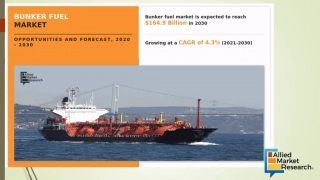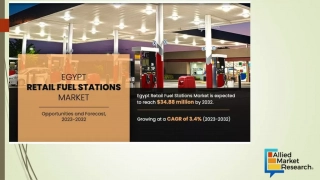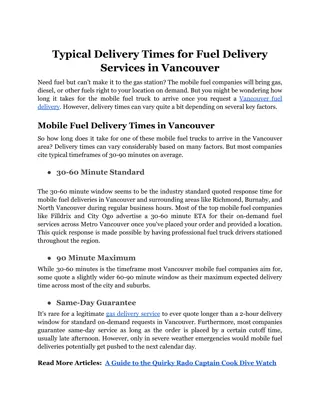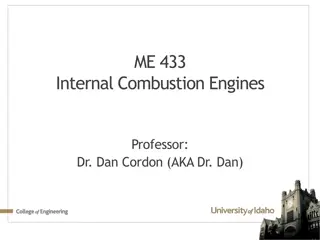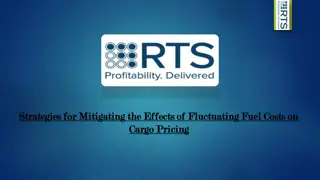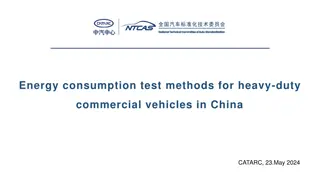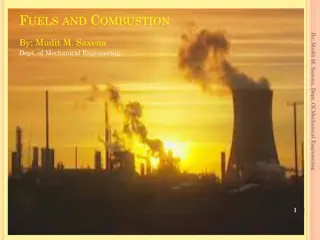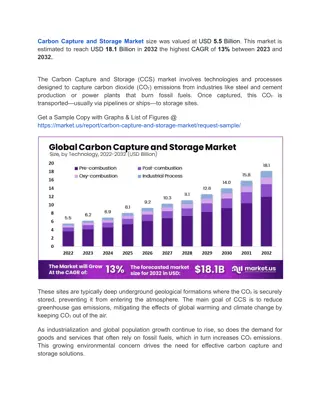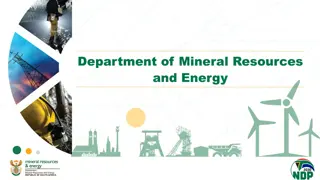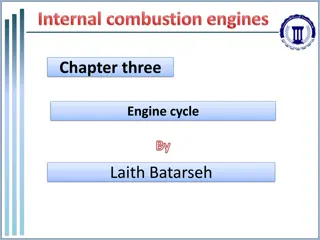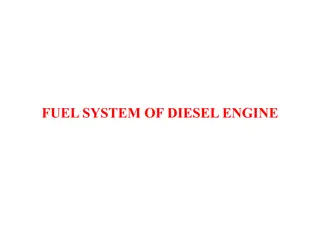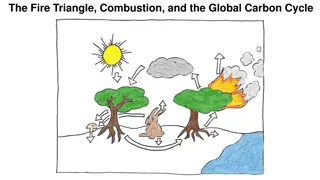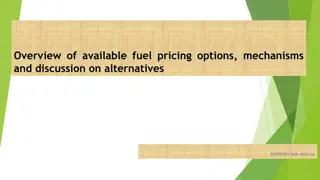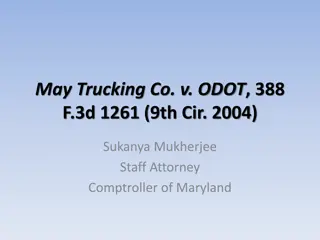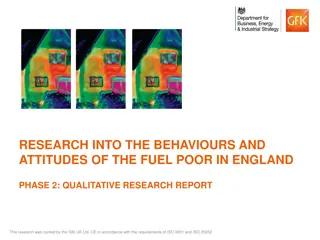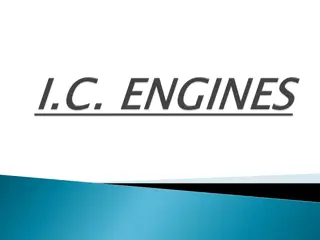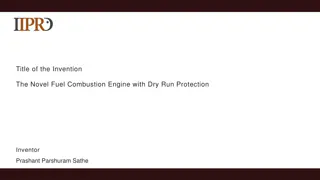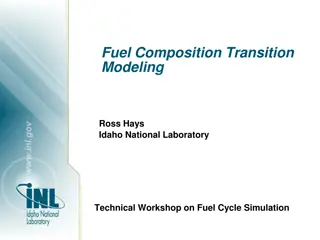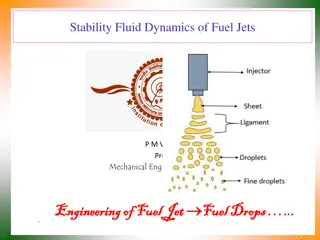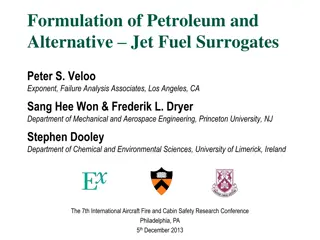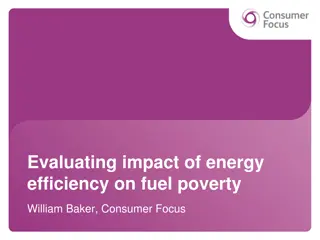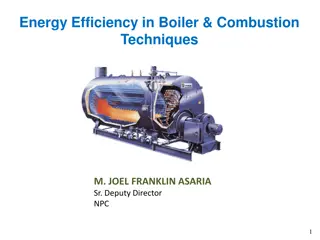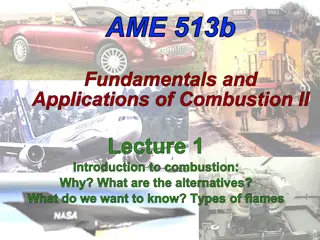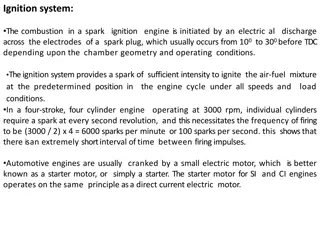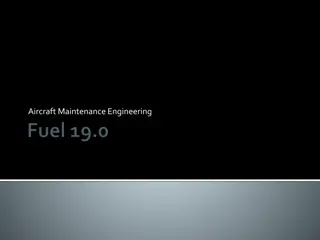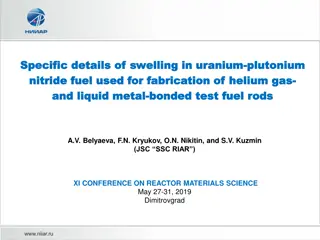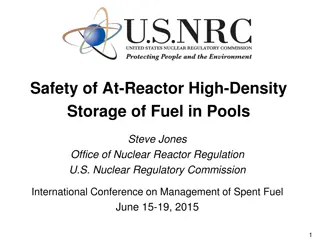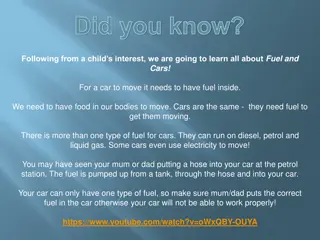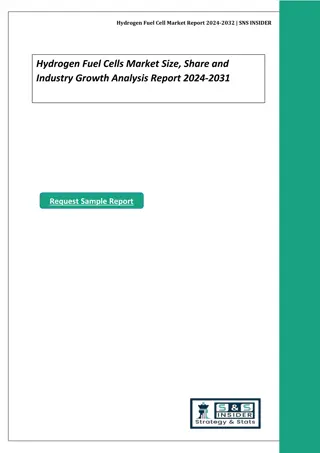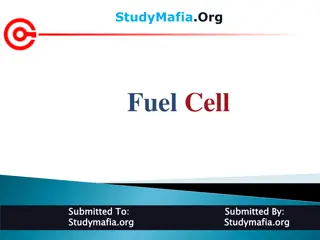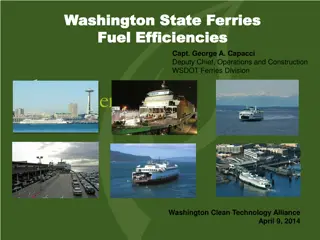Bunker Fuel Market
Bunker fuel is a fuel oil used in marine vessels. It is poured into the ship bunkers to keep the engines running. Ships use three types of marine fuels, which include high sulfur fuel oil, low sulfur fuel oil, and diesel oil. Presently, growth in awareness toward reducing environmental pollution and
2 views • 6 slides
Bunker Fuel Market
Bunker fuel is a fuel oil used in marine vessels. It is poured into the ship bunkers to keep the engines running. Ships use three types of marine fuels, which include high sulfur fuel oil, low sulfur fuel oil, and diesel oil. Presently, growth in awareness toward reducing environmental pollution and
1 views • 6 slides
Bunker Fuel Market
Bunker fuel is a fuel oil used in marine vessels. It is poured into the ship bunkers to keep the engines running. Ships use three types of marine fuels, which include high sulfur fuel oil, low sulfur fuel oil, and diesel oil. Presently, growth in awareness toward reducing environmental pollution and
6 views • 6 slides
Egypt Retail Fuel Stations Market
A fuel station, also known as a petrol station, gas station, service station, or filling station, is a retail outlet that sells motor vehicle fuel to vehicle owners. Fuel stations provide various fuels including diesel, petrol, gasoline, kerosene, and ethanol. The main components of a fuel station i
5 views • 6 slides
Advancements in Hydrogen Combustion for Internal Combustion Engines
Exploring the utilization of hydrogen as a sustainable fuel for internal combustion engines, this research delves into the mixing, combustion, and particulate formation processes in H2ICE. Discussions cover the benefits of hydrogen, challenges faced, and innovative solutions like onboard on-demand h
0 views • 21 slides
Typical Delivery Times for Fuel Delivery Services in Vancouver
Need fuel but can't make it to the gas station? The mobile fuel companies will bring gas,\ndiesel, or other fuels right to your location on demand. But you might be wondering how\nlong it takes for the mobile fuel truck to arrive once you request a Vancouver fuel\ndelivery. However, delivery times c
9 views • 4 slides
Understanding Fuel Surcharges and Their Impact on Cargo Pricing
In the realm of logistics and transportation, understanding the intricate factors influencing cargo pricing is crucial for both providers and consumers. One of the significant components that often affect pricing dynamics is the imposition of fuel surcharges. These surcharges play a pivotal role in
4 views • 5 slides
Understanding Fuel Chemistry in Internal Combustion Engines
Fuel chemistry knowledge is crucial for internal combustion engines for various reasons such as determining air-fuel ratios, ensuring efficient combustion, preventing detonation, and optimizing power output. Balancing chemical equations, calculating specific volume for mixtures, and analyzing first
10 views • 19 slides
green hydrogen market
green hydrogen is used as fuel to provide a sustainable mobility alternative. Fuel cells make vehicles more efficient and quieter; using green hydrogen allows vehicles to travel longer distances with less refueling. The increase in demand for green hydrogen is also due to growing government initiati
1 views • 3 slides
Strategies for Mitigating the Effects of Fluctuating Fuel Costs on Cargo Pricing
Fuel costs represent a significant portion of operational expenses in the cargo industry. Volatility in fuel prices can dramatically impact profitability and competitiveness. Therefore, effective strategies for managing these fluctuations are crucial for maintaining stability in cargo pricing. Here
11 views • 6 slides
Energy Consumption Test Methods for Heavy-Duty Commercial Vehicles in China
China has released energy consumption testing methods for various types of fuel vehicles, including traditional fuel vehicles, hybrid electric vehicles, battery electric vehicles, fuel cell vehicles, natural gas vehicles, and methanol vehicles. The standards cover test methods for fuel consumption a
4 views • 15 slides
Exploring Fuels and Combustion in Mechanical Engineering
This content delves into the intricate world of fuels and combustion, discussing classifications, properties, and origins of various fuels such as solid, liquid, and gaseous. It covers the importance of desirable fuel properties, caloric values, and the different types of natural and artificial fuel
0 views • 34 slides
High Costs and Safety Issues Challenge Carbon Capture and Storage Adoption
Carbon Capture and Storage Market By Technology (Pre-combustion, Post-combustion, Oxy-combustion, and Industrial Process), By End-Use Industry (Power Generation, Oil & Gas, and Other End-Use Industries), By Region and Companies \u2013 Industry Segmen
0 views • 4 slides
Preliminary Analysis of Fuel Dependence and E-Mobility in the Pacific
This study by PhD Candidate Edoardo Santagata at UNSW delves into the fuel dependence and potential for e-mobility in the Pacific region. It includes data collection on energy consumption, fuel demand, vehicle registrations, and scenarios for electric vehicle integration. Preliminary findings highli
1 views • 17 slides
Fuel Pricing Mechanisms and Regulatory Framework Presentation
This presentation to the Portfolio Committee on Mineral Resources and Energy delves into the Basic Fuel Price (BFP) for liquid fuels, covering global fuel pricing forms, policy positions, key pricing mechanisms, regulatory mandates, and the intricate structure behind fuel prices. It explains how the
2 views • 28 slides
Understanding Engine Cycle Analysis
The engine cycle analysis delves into the intricate processes within a combustion chamber, simplifying the complex interactions of air, fuel vapor, and exhaust gases. Idealized assumptions help analyze the constant-pressure intake, compression, and expansion strokes, along with the combustion proces
1 views • 48 slides
Understanding the Fuel System of Diesel Engines
During operation, a diesel engine's fuel system plays a crucial role in delivering clean fuel to the combustion chamber. The system comprises components like fuel filter, fuel lift pump, fuel injection pump, atomizers, and high-pressure pipes. Proper maintenance is essential to ensure efficient oper
5 views • 12 slides
Understanding the Fire Triangle, Combustion, and the Global Carbon Cycle
This series of images explores the concepts of the fire triangle, combustion, and the global carbon cycle. It delves into the role of oxygen, fuel, and heat in combustion processes, leading to the production of carbon dioxide, water, heat, and light. The images further illustrate the chemical proces
1 views • 12 slides
Fuel Pricing Mechanisms and Regulation Overview
Explore the various fuel pricing options and mechanisms available, including a discussion on alternatives for fuel pricing regulation. The objectives of fuel price regulation, classifications of fuel pricing in the Pacific Islands, and options such as regulating fuel price and tendering national fue
1 views • 11 slides
May Trucking Co. v. ODOT - Ninth Circuit Case Analysis
May Trucking Company, an interstate motor carrier, challenged an assessment by the Oregon Department of Transportation (ODOT) for underpaid fuel taxes. The dispute centered on whether fuel consumed during idling should be taxable under the International Fuel Tax Agreement (IFTA). The Administrative
2 views • 9 slides
Qualitative Research on Behaviours and Attitudes of Fuel Poor in England
The research conducted by GfK UK Ltd. delves into the behaviours and attitudes of the fuel poor in England, challenging preconceptions and exploring how they cope with fuel poverty, perceive energy efficiency, and could be encouraged to take up energy-saving measures. Through 50 in-depth interviews,
1 views • 36 slides
Overview of Internal Combustion Engines and Their Components
Internal combustion engines are devices that convert fuel's chemical energy into thermal energy, which is then used to produce mechanical work. The engines can be classified into two types - External Combustion Engines and Internal Combustion Engines. Internal combustion engines include components l
2 views • 53 slides
Understanding Small Gasoline Engine Performance
This chapter explores the intricacies of measuring and optimizing internal combustion engine performance, focusing on calculating functional horsepower through various formulas and measurements. It delves into the combustion process in a small gasoline engine, detailing how the air/fuel mixture igni
0 views • 66 slides
Novel Fuel Combustion Engine with Dry Run Protection
This invention by Prashant Parshuram Sathe addresses the crucial issue of preventing damage to fuel combustion engine pumps caused by dry running. The innovative mechanism stops fuel flow in the absence of fluid, preventing overheating and damage. Investing in this technology at an early stage offer
0 views • 10 slides
Progress Update on Dry Fuel Storage Casks at VYNPS
Thirteen Holtec 100 Dry Fuel Storage Casks have been safely loaded and stored at VYNPS, with plans for a total of 58 casks across two Independent Spent Fuel Storage Installation pads. The transfer of spent fuel to Dry Cask Storage is scheduled to be completed by late 2020, following the issuance of
3 views • 10 slides
Fuel Composition Transition Modeling in Two-Stage Recycling Reactors
Modeling the transition of fuel composition in a two-stage recycling reactor scenario poses a unique challenge that previous versions of VISION were unable to address. By tracking fuel mass and isotopics through various stages of the fuel cycle, VISION now enables the modeling of reactors with recip
0 views • 15 slides
Insights into Fuel Jet Stability and Dynamics
Explore the complex realm of fuel jet stability and dynamics, including topics such as Kelvin-Helmholtz instability, liquid breakup postulations, geometric features of fuel sprays, penetration of spray into air, and more. Gain a deeper understanding of fuel drop formation, spray parameters, structur
1 views • 18 slides
Advances in Aviation Fuel Surrogates and Computational Modeling
This study explores the formulation of petroleum and alternative jet fuel surrogates, coupling chemical kinetics with computational fluid mechanics for engine design, and the variability of aviation fuels. It delves into the concept of surrogate fuel models, previous research on jet fuel surrogates,
0 views • 20 slides
Understanding Energy Poverty and Its Impact on Fuel Poverty in Europe
Evaluating the impact of energy efficiency on fuel poverty, this study examines the emergence of energy poverty in the EU, factors driving fuel poverty across Europe, and UK's definition of fuel poverty. It discusses various policies and strategies implemented to address fuel poverty, emphasizing th
0 views • 16 slides
Energy Efficiency in Boiler & Combustion Techniques
This article discusses energy efficiency in boiler systems and combustion techniques, covering topics such as boiler types, classifications, specifications, and applications. It explains the process of heat generation through fuel combustion, transfer to water for steam production, and highlights va
0 views • 70 slides
Fuel Cycle Analysis Toolbox: Enhancing Understanding and Optimization
This presentation focuses on the analyses and evaluations essential for assessing the potential of a fuel cycle, emphasizing different time scales, system sizes, objectives, and audiences. It discusses the need for coupled analyses, various tools required, and opportunities for improvement through i
1 views • 11 slides
Fundamentals of Combustion II - Introduction and Nomenclature
This lecture introduces the fundamentals of combustion by discussing reasons for studying combustion, alternative energy sources, and what we aim to understand. It covers different types of flames and provides a comprehensive nomenclature summary for the course, including various parameters and thei
0 views • 32 slides
Understanding the Ignition System in Internal Combustion Engines
The ignition system in spark ignition engines initiates combustion through electric discharge across the spark plug electrodes. It ensures proper ignition timing for efficient engine operation at various speeds and loads. Modern ignition systems include battery, magneto, and electronic ignition type
0 views • 21 slides
Comprehensive Overview of Aircraft Maintenance Engineering and Fuel Systems
Explore the intricate world of aircraft maintenance engineering encompassing fuel types, storage, lines, valves, filters, tanks, and more. Delve into AVGAS and JET fuels, their properties, and applications in operations. Gain insights into fuel tanks construction, fuel lines management, and the impo
1 views • 25 slides
Investigation of Swelling in Uranium-Plutonium Nitride Fuel for Helium Gas Fabrication and Liquid Metal-Bonded Test Fuel Rods
This study examines the specific details of swelling in uranium-plutonium nitride fuel used for fabrication of helium gas and liquid metal-bonded test fuel rods. Key irradiation parameters, examination techniques, and the structural and phase state of SNUP fuel after low-temperature irradiation are
0 views • 18 slides
Enhancing Safety and Management of Spent Fuel in High-Density Storage
This informative presentation delves into the safety measures and regulatory changes surrounding the storage of spent fuel in high-density pools. Topics covered include the design of spent fuel pools, historical regulatory activities, past studies on fuel uncovery risks, and advancements in analytic
0 views • 17 slides
Exploring Fuel and Cars: A Child's Guide
Cars need fuel to move, just like we need food to function. There are different types of fuels for cars, including diesel, petrol, liquid gas, and electricity. Learn how oil is formed, extracted from the earth, and processed into fuel. Explore the journey of fuel from oil rigs to your car's tank. Di
0 views • 6 slides
Hydrogen Fuel Cell Market
\nHydrogen Fuel Cells Market Size, Share & Segmentation By Product Type (Liquid-Cooled Type and Air-Cooled Type), By Technology Type (Polymer Exchange Membrane Fuel Cells (PEMFC), Phosphoric Acid Fuel Cells (PAFC), Solid Oxide Fuel Cells (SOFC), Dire
1 views • 8 slides
Understanding Fuel Cells: Definition, Working, and Applications
Fuel cells are electrochemical cells that generate electricity through reactions between fuel and an oxidizing agent like oxygen. They offer high efficiency compared to traditional power plants. The working of fuel cells involves hydrogen and oxygen reacting to produce electricity. NASA has utilized
0 views • 20 slides
Washington State Ferries Fuel Efficiency Initiatives
Washington State Ferries (WSF) is implementing various fuel efficiency measures to reduce fuel consumption, including propeller redesign, hull coatings, and operational changes. The importance of fuel efficiency is highlighted as fuel represents a significant portion of the operating budget. WSF has
0 views • 12 slides


